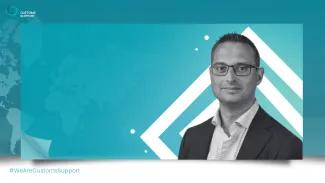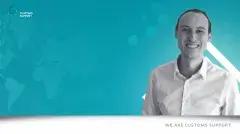In this edition, we are excited to present Operations Director Belgium Steven Cossaer, who works with our Belgian branches to ensure that our people have the resources they need, clients are serviced well, and that we are able to maintain quality as we expand.
Join us as Steven shares his insights and how Customs Support Belgium has come together following acquisitions.
Who are you?
My name is Steven Cossaer; I am 41 years old, and I have been working with the team here in Belgium for 21 years in October. We haven’t always been Customs Support, of course, as we were originally European Customs Agency (ECA) until our acquisition in 2018.
My role here is the operations director.
What does an operations director do at Customs Support Belgium?
It’s my job to ensure that we have everything in place operationally. What this means is ensuring that our people have the right equipment and guidance to do their role correctly, that our processes are followed, and that our clients are serviced well.
Basically, I – along with all our team leaders – ensure that everyone stays happy.
What’s your typical working day?
It depends on the day, but I am mostly checking in with our staff and clients. We have weekly meetings with operational team leads, who take care of our daily operations and the onboarding of new clients.
I also check in with our compliance and HR teams, who keep me updated on upcoming changes to legislation, staff requirements, and other considerations which can have an effect on the team.
These checkpoints help me to see what’s coming up and proactively adjust workloads. All the offices in Belgium use the same software, so we work together to cover any potential overload on a single team.
Outside of this, I am also working with our international team in The Netherlands.
What do you like most about the change to Customs Support from the European Customs Agency?
New possibilities. I love working with the team here, and have done so for nearly 21 years, but the international capacity is far greater now that we are part of the Customs Support Group. We are working with EDI connections, interfacing, and with other digital customs clearance functions.
The move to a more international market, with larger clients and a more diverse portfolio of services, makes my job more interesting than it was when I first started 21 years ago.
You are also responsible for post-merger integration (PMI). How have the acquisitions changed Customs Support Belgium?
The team in Belgium has come together very well, following the acquisition of a few smaller companies, and last year Portmade joined the Customs Support group. We have joined forces in our Antwerp office, merged the boards, and migrated most of our people onto the same systems.
It’s been a big project, but the team have worked fantastically well together and continue to push towards full integration.
Now that we are in one place, the ideas flow better between us, and we are also working more with the systems and digital processes that have come to us from Portmade.
What do you like to do when you aren’t at work, and how does that influence your work skills?
I like to relax when I am not at work, eating good food and chilling out. Of course, I need to do sports to offset that, so I am in the gym a few times a week as well. I am more into core and bodyweight training than weights or cardio, but I have started cycling this year as well.
Having the time off to enjoy life and stay fit helps me to stay in a good mood when I am at work. I am relaxed and in good spirits, so I can take on the day-to-day challenges without getting overwhelmed.
What is the most important thing that clients should look for in a customs partner?
Reliable compliance: you need to make sure that they are compliant all the time and that they are not falling down in the harder areas whilst being good in the easy parts.
It’s very important to us that we are doing everything correctly and not just getting things done any way we can. We want to do the best job that we can and that’s what we stand for.
Sometimes this can mean educating clients, especially when they switch their customs provider after a long time. We often see things that have been done wrong and need to explain why we can’t continue even though it has cleared like that previously. We ensure that we remove those bad practices so that you are compliant going forwards.
You work with a Europe-wide network. If you were to visit a location of Customs Support, which country would you want to see first and why?
Spain. I am very much into sunny weather and southern-European countries, so Spain.















